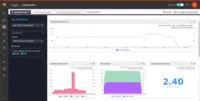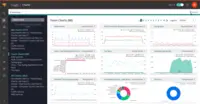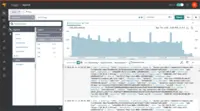Overview
What is SolarWinds Loggly?
Loggly is a cloud-based log management service provider. It does not require the use of proprietary software agents to collect log data. The service uses open source technologies, including ElasticSearch, Apache Lucene 4 and Apache Kafka.
Loggly is Omniscient!
Solid and cost effective
SolarWinds Loggly Gives You the Insight You Didn't Know You Needed
I'm very happy with SolarWinds Loggly!
Centralized data for post mortem to detect the next calamity before it happens
Thank to Loggly, "LOGS" is no longer a dreaded four-letter word.
Loggly has been great value for the price
Great product but not for us
The Best Log You Want in your Eye!
Very powerful logging system
A real centralized solution for you application monitoring
Loggly rocks
Useful, stable service with some possible areas for improvement
Loggly is a great all-in-one-place tool to manage your logs!
SolarWinds Loggly Review by a Mid-Level DevOps Engineer
Awards
Products that are considered exceptional by their customers based on a variety of criteria win TrustRadius awards. Learn more about the types of TrustRadius awards to make the best purchase decision. More about TrustRadius Awards
Pricing
Standard
$79
Pro
$159
Enterprise
$279
Entry-level set up fee?
- No setup fee
Offerings
- Free Trial
- Free/Freemium Version
- Premium Consulting/Integration Services
Product Details
- About
- Integrations
- Competitors
- Tech Details
- FAQs
What is SolarWinds Loggly?
With environments spanning on-premises, hybrid, and public cloud environments, IT operations and application teams are inundated with unrelated events, issues, and logs. Every outage or slowdown directly impacts the business, either in lost productivity or lost revenue. Issues must be diagnosed rapidly and resolved across all the dynamically changing components underpinning your heterogeneous web applications, services, and infrastructure.
SolarWinds® Loggly® is presented by the vendor as a cost-effective, hosted, and scalable full-stack, multi-source log management solution combining powerful search and analytics with comprehensive alerting, dashboarding, and reporting to proactively identify problems and significantly reduce Mean Time to Repair (MTTR).
SolarWinds Loggly Features
- Supported: Highly responsive search at scale
- Supported: Interactive shareable dashboards
- Supported: Anomaly detection and alerts
- Supported: Dynamic Field Explorer™
- Supported: Rapidly pinpoint bottlenecks and failure points
- Supported: Collaborate with all stakeholders
- Supported: New shared agent that collects metrics and logs
- Supported: Add trace context to your logs
SolarWinds Loggly Screenshots
SolarWinds Loggly Integrations
- Mirantis Kubernetes Engine
- Node.js
- Linux
- Amazon S3
- Python
- NGiX
- Apache
SolarWinds Loggly Competitors
SolarWinds Loggly Technical Details
| Deployment Types | Software as a Service (SaaS), Cloud, or Web-Based |
|---|---|
| Operating Systems | Unspecified |
| Mobile Application | No |
| Supported Countries | All |
| Supported Languages | English, Spanish |
Frequently Asked Questions
SolarWinds Loggly Customer Size Distribution
| Consumers | 0% |
|---|---|
| Small Businesses (1-50 employees) | 25% |
| Mid-Size Companies (51-500 employees) | 50% |
| Enterprises (more than 500 employees) | 25% |
Comparisons
Compare with
Reviews and Ratings
(79)Community Insights
- Business Problems Solved
- Pros
- Cons
- Recommendations
Loggly has proven to be an invaluable tool for a wide range of use cases, allowing users to effectively troubleshoot and prevent issues. With its syslog digest capabilities, users can sift through logs to identify the root cause of outages and errors, creating alerts for future prevention. By serving as an aggregation point for streaming logs from network access switches and core routers, Loggly efficiently manages large volumes of data. This makes it a valuable tool for support and engineering teams, providing alerting, monitoring, and issue triage solutions. Additionally, Loggly acts as a central repository for logs from PHP-based apps and servers, offering reports, analysis, and aggregation from different sources. Its flexibility extends to monitoring and debugging large-scale application platforms leveraging multiple microservices. By providing detailed information across different environments, Loggly enables efficient issue tracking and resolution. It also aids in meeting auditing requirements by logging network activity and providing proof of network monitoring. Furthermore, Loggly is widely used to troubleshoot systems, gain insights into performance and health, and visualize trends through its dashboard and alarm capabilities. Whether it's monitoring web traffic, capturing logs to identify security threats on internal and external websites, or monitoring integrations between websites and APIs, Loggly proves to be an essential tool in enhancing monitoring capabilities. Its ability to capture the behavior of software applications during development allows for easier investigation and setting up alerts to prevent service disruptions. Loggly is considered a modern platform for log-file analysis due to its compatibility with Linux systems, plaintext config files, utilization of web standards, and open-source friendly nature. Overall, Loggly plays a crucial role in troubleshooting server and application issues by providing effective solutions for resolving problems.
Intuitive and Easy to Use Interface: Users consistently praise Loggly's intuitive and easy-to-use interface, stating that it simplifies tasks and makes them easier to perform. The user-friendly design allows for quick navigation and access to log data, enhancing overall usability.
Highly Effective Alerting System: Many users appreciate the flexibility and effectiveness of Loggly's alerting system, finding it easy to set up alerts for specific events. Notifications can be received through email or Slack, ensuring that users stay informed about critical issues in their applications.
Comprehensive Integration Options: Reviewers value the extensive integration options provided by Loggly, which support a wide range of log sources and platforms. This feature enables users to consolidate logs from different sources into a centralized location for monitoring and analyzing data effectively.
Confusing User Interface: Many users have expressed frustration with Loggly's user interface, stating that it is confusing and difficult to navigate. They find it challenging to perform tasks effectively due to this issue, which negatively impacts their overall experience with the platform.
Cumbersome Query Language: Some users have found Loggly's query language to be cumbersome and unintuitive. They believe that using the query language adds unnecessary complexity to their log analysis process, making it more time-consuming and challenging to extract meaningful insights from their logs.
Difficulty in Sending Logs: Several users have encountered difficulties when trying to send logs to Loggly, particularly depending on the source system they are using and the level of control they have over it. This has caused inconvenience for these users as they face challenges in seamlessly integrating their logs into Loggly for effective analysis and monitoring.
Users commonly recommend considering alternatives and exploring other options in addition to Loggly. They suggest looking into different logging and monitoring solutions before making a decision.
Another common recommendation is to ensure the correct data is inputted and to tweak the data sending process if necessary. Users advise being careful with the data that is being sent to Loggly and making any necessary adjustments to improve the accuracy of the logs.
Integrations and tools are also mentioned as important factors to consider. Users suggest looking into the available integrations and using tools to build the desired structure for log management and analysis.
It is worth noting that some users recommend spending time reducing log noise and standardizing the log entry process. They emphasize the importance of streamlining the logs to avoid unnecessary clutter and confusion.
Additionally, users suggest using Fluentd as an adapter to ensure Loggly receives all the necessary information. They find it helpful for ensuring smooth communication between systems.
Having someone knowledgeable who can provide training on Loggly is also recommended by users. They believe that having assistance from an expert can greatly enhance the user experience.
Organizing requests and their results is another recommendation made by users. They find Loggly useful in this regard, as it helps them keep track of their requests and easily access the corresponding results.
While many users find Loggly to be a good initial solution, some mention that costs can increase as usage grows. It is advised to keep this in mind when considering long-term usage of the platform.
Overall, users describe Loggly as an excellent solution for debug log management and analysis. They appreciate its functionality, especially with the addition of the live-tail client. Some users compare Loggly to LogEntries and note that they find Loggly to have better polish.
Attribute Ratings
Reviews
(1-25 of 36)Solid and cost effective
- Reliablity
- Performance
- Ease of use
- Web search interface seems to periodically lose my saved tabs.
SolarWinds Loggly Gives You the Insight You Didn't Know You Needed
- Not surprisingly, SolarWinds Loggly does a great job of capturing logs.
- SolarWinds Loggly has really good reporting and data filtering built into the system.
- SolarWinds Loggly has alerting built into the platform that allows you to create custom notifications. The notifications allow you to proactively see an issue before it affects the end users.
- SolarWinds Loggly has prebuilt plugins for some of the most common data sources. We've only needed the NGINX integration and it was really easy to setup and configure.
- SolarWinds Loggly's customer service has always been responsive and easy to work with.
- It would be great if you could setup SolarWinds Loggly to send a daily summary to your inbox so you can see yesterday's logs without having ot log into SolarWinds Loggly.
- It would be nice to have the ability to share a report with a colleague or outside vendor via email.
I'm very happy with SolarWinds Loggly!
- Keeping logs from different integrations in 1 place
- Being able to filter to find the relevant logs
- Sending notifications when some logs occur
- More options when setting up alerts would be welcome
- Being able to update an alert query once it is created
- When selecting 'view before and after events', keep the same search parameters (tags, for example)
- syslog digest
- alerts based on syslog contents
- sanity check on number of daily log events
- post mortem on outages
- the interface could be more intuitive
- repetitive syslog dialog could either be highlighted or ignored by user choice
- when a source spikes it's name could be included in the volume alert email
Loggly has been great value for the price
- We love that we get 1gb of log storage per day (a limit we'll probably never even come close to touching)
- We are able to send alerts based on thresholds that we set.
- The Search feature is very powerful and it allows you to save searches.
- The UI is a bit outdated.
- Longer log storage would be great.
Great product but not for us
- Customizable Dashboards
- Azure integration
- Webhook integration
- Cost
- Speed of support
- Better searching
- Better user management
Very powerful logging system
- Very fast searching capabilities.
- Easily handles huge volumes of logs.
- Searches are not always very intuitive.
- User management is not the best.
A real centralized solution for you application monitoring
- Multiple sources for the logs, the amount of log sources available in Loggly is amazing! You can log from almost everything you can have running out there.
- The charts and dashboards, it's really easy to find and see the information you need to find problems you might be having without noticing.
- Centralization and aggregation, having multiple auto-scalable microservices running Loggly makes it really easy to centralize and aggregate all the data coming from these microservices.
- The volume pricing scheme is tricky, as usually, you don't need more features but just more volume. I think a big improvement would some per/GB/MB pricing scheme if the volume is so important and not the 200MB, 1GB, and 100GB per day jumps that forces you to be controlling how much you log because, usually in the case of an incident, you can have more than 1GB per day but then on a normal day volume can fall below 200MB.
Loggly rocks
- Ingestion
- Dashboards
- Alerts
- User management
- SSO
Useful, stable service with some possible areas for improvement
- Intuitive step-by-step filtering by message attributes.
- Collapsing/extending log event data.
- Flexible log list presentation with selection of attributes to present.
- Graphical presentation of log events.
- Ability to filter out specific type of messages from the list to focus on important ones. Filter by example.
- Ability to send separate streams with cheaper cost and deeper storage, slower access times on demand only in specific cases.
SolarWinds Loggly Review by a Mid-Level DevOps Engineer
- Easily takes sys-log connections from an app's standard output.
- Easy to navigate the user interface.
- Begins ingesting logs as soon as the connection to an app is made.
- Having to add users to Loggly after having created them in AppOptics could be improved.
- When search parameters are too specific Loggly often has a hard time filtering for what I'm looking for.
- While it's easy to navigate, the UI isn't very pretty.
Loggly's as easy to use as a Linux tail
- Fast setup and deployment.
- Very customizable.
- Searching and sorting relevant data is intuitive.
- It's not free.
- Won't run stand-alone on-premises.
- Doesn't look as slick as some other alternatives.
Fire and forget logs
- Keeps working!
- Fast searches.
- Easy to configure searches - you don't have to be an expert in RegExp...
- Not all searches are intuitive.
- We have to use a log aggregating device to ship our logs to Loggly as our network devices can not connect on an encrypted protocol. I would prefer if we could use some sort of VPN-based connector to ship logs securely.
- Sometimes when drilled down, it can be difficult to fully reset a search term to back all the way out of a drill down.
Loggly - a win for our estate log management and alerting
We are able to log different areas of the business, grouping systems and apps. this allows our searching and history tracing for logs to be much more effective.
- The collection tools for Loggly are very strong and the setup for those tools is incredibly easy.
- Support are fairly quick to respond and super helpful.
- Capturing and interrogating logs is easy across many deployments, platforms and devices.
- Sometimes queries don't work as you think they should.
- Getting data arranged so that everything comes to play is fiddly.
- Daily data limits can be a pain if you have a spike in logging.
The querying system could do with a better FAQ or guidance as when trying to run a structured query, sometimes no data is found even though you can definitely see that data by manual search.
Loggly helps us daily. However, its search and reporting capabilities also leave us wanting more.
- Loggly is easy to integration. If you can make JSON from your logs you can use it. Adding it to a Python stack was trivial. Standard python logging, Loggly backend.
- Easy user management to allow people see view the logs.
- Documented API to retrieve and query the logs.
- The search interface. It remembers the last time window you chose. So you constantly are looking at the wrong logs.
- Everything is chunked on words. So searching for say an email address does not consistently work be it breaks someone@somewhere.com into someone, somewhere, com.
- filtering in the results is quite limited. Copy and paste is often broken by how the results are displayed.
- Finding the link to share a particular log is a process of frustration of finding just the right place to click to make the buttons appear.
Easy and quick logfile monitoring
We monitor operating system, web server and application logs. This allows us to detect load peaks, issues in the application, attempted attacks or any other anomalies early.
- A key feature for me is drilling down logs, finding what I am looking for quickly.
- Creating graphs and dashboards for important information at a glance.
- Setting alarms in case something unexpected happens.
- Adding log sources is easy.
- Users that want to use Loggly to its full power need to invest some time.
- It's not very cheap.
- I struggled adding logs with dynamic names.
Loggly is also very good to monitor logs from many servers at once, a feature that I don't use but would recommend doing if applicable.
Loggly: we needed something fast and it worked well.
- Ease of setup
- Intuitive UX
- Response times are fast
- The system seemed to lack the power (AI anomaly detection) of other offerings, but we were only on the free tier.
- No advanced features were evaluated.
Loggly is good
* Aggregating all of our logs.
* Deriving metrics from our logs.
* Sending alerts to our team when those metrics change in some way that matters to us.
- Putting our logs in one place and making them searchable. We use AWS, and CloudWatch has always been a little frustrating in this regard (though it has gotten better recently).
- Deriving metrics from our logs. I think log-based metrics is such a good idea because your logs are the ultimate source for truth in regards to what the hell is going on inside your app. I have really loved the simplicity with which I can just count certain statements and call that a metric because just through the normal course of development certain log statements just naturally become a straightforward recording of an event having occurred.
- Alerts. I actually have a few complaints about email alerts, but just the way I was able to set them up so easily has been huge. Since we started using Loggly, there have been at least 3 bugs that Loggly exposed that were frankly very bad. And withoutt Loggly or without a user reporting them, we would have never known they were happening! This is stuff I tried to set up in CloudWatch in various ways, but because of my own ignorance or perhaps the complexity/limitations of CloudWatch (or the complexity of my stack?), I wasn't getting the information that I needed until I was able to just tell Loggly to send me an email whenever the word "error" showed up.
- I would love the ability to able to suppress a particular "event" instead of an entire alert. For example, sometimes an error is caught and handled but the word "error" is still printed to the logs. It would be nice if I could mark an event as "handled" without suppressing the entire alert for n minutes- if I do that then I would miss a real error that happened in that window. Also if I have my alerts set to run every minute checking the last five minutes, I will get 5 emails. It would be nice if there was some de-duplication. I have actually considered setting up webhooks into some API of my own instead of just emails to do this.
- I find the query language to be a little cumbersome. I suspect this is something you guys inherited from whatever index you use, but things like the __exists__ flag are strange. If I just type something into the field I am often surprised that I have to put quotation marks in (instead of it just searching for the term I supplied without any advanced features).
- Derived fields sometimes frustrate me, especially when I am using regex. I will sometimes create regexes that work in a test bed but do not work in Loggly. It is frustrating that I always have to match the beginning and the end of the string.
- The dashboards can be frustrating, especially when I am just trying to put a single number metric in a chart. I should be able to create a chart with multiple metrics: multiple charts with a single metric in each takes up a ton of space and limits the usability of the dashboard
Use it if your devs can log effectively or you'll end up in a jam when you hit your cap
- It can log whatever a developer decides to add information about.
- Zooming in on a particular time frame is helpful.
- The ability to tag/label events.
- Once the logging limit is exceeded, there are no logs period. Unexpectedly noisy logs often correlate with services misbehaving and potentially leading to disruption. An outage is an awful time to lose visibility into the entire system of apps. Some ways to bridge this gap would be appreciated.
- Filtering by tags is not intuitive in the web interface. You may believe that you are performing the same search and filter as last time since the tags entered are the same, however, this is often not the case. The reliable way to know that you have the same filter is to bookmark the URL. This lack of ease in usability results in devs using Loggly less than they could and implementing logs less effectively during development time (since they don't consider themselves likely to view them anyway).
- Would like to see a way to onboard our less experienced devs to using Loggly effectively.
Loggly's price and ease of deployment compared to many alternatives make it a no-brainer.
- Creating alerts for specific events is very easy.
- Data visualizations are easy to configure; some are baked in.
- The price of Loggly is well below all other cloud logging tools I reviewed.
- Extra pre-baked dashboards would be useful.
- Searching for multiple conditions sometimes fails even when each of the fields can be found individually within a log message.
- Documentation to configure S3 archives needs to be updated to reflect the current Loggly GUI options.
Great tool, love it!
- Simple search.
- Great visualization.
- Easy to use.
- Very practical.
- Maybe examples of advanced filtering.
Loggly gets the job done, every time.
- Detecting logs messages for alerts
- Log drill-downs through attributes
- Bringing various sources together
- Charts/metrics
- Understanding and adapting to specific formats
- Docker system ingesting
Testing Loggly for a New Centralized Logging Platform
- Centralized logging: having logging for multiples sites (networks) all under one roof was really nice.
- Customer support: the customer support was outstanding when we had issues with our deployment of our first nxlog configuration.
- Ease of use: though there is a small learning curve, once conquered, Loggly becomes a very handy tool when needing to pull up past events or logs.
- nxlog: having to use another piece of software is a bummer
- nxlog configuration: the learning curve for nxlog is monumental and not very intuitive
- 1:1 Alerting: Loggly does not support this which is ultimately why my company is looking elsewhere. The alerting does not mesh well those who want login and logout alerts in real-time
Loggly: Pleasantly surprised!
- Makes viewing logs more readable.
- Allows us to pull logs from different sources.
- Search is good, when you know how to use it.
- Support is not the best, it's only email and they won't get on a remote session with you.
- Bit of a learning curve to get started.
- Had issues with getting CloudWatch logs, had to escalate to a higher support rep.
A startup engineer's review on Loggly
- Quick customer supports. I found an issue and the customer service provided some workarounds before the final fix.
- Easy HTTP integration. I integrated into my own Lambda function so I can process logs with my own logic.
- Speedy (majority of the time).
- Clean UI.
- Cooler Charts/Dashboard.
- More intelligent input prompts.
When I was in my previous company there were teams taking care of the ElasticSearch and Logstash so I only needed to use Kibana. In my current startup, I feel it's easier to use Loggly.








